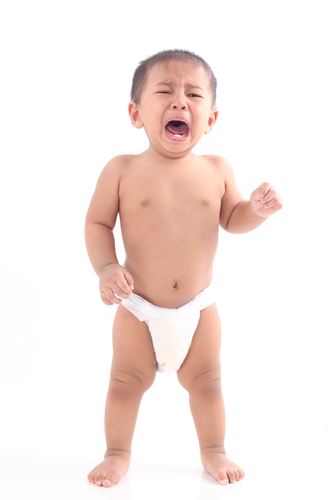PHILADELPHIA — Imelda Rodriguez waits “as long as my kids can handle it” before changing the diapers of her youngest children, ages 3 years and 2 months.
For low-income parents like Rodriguez, a 34-year-old married homemaker in Warminster, Pa., it’s sometimes easier to get food than diapers, which can cost as much as $100 a month for one child.
And lack of diapers can have far-reaching implications beyond the rashes and urinary tract infections suffered by children not changed often enough.
Parents living in poverty may reuse wet and soiled disposable diapers, causing uncomfortable children to fuss and cry. That, in turn, can incite child abuse, said Joanne Goldblum, executive director of the National Diaper Bank Network, which supplies diapers to community organizations.
Also, most child care facilities won’t allow parents to drop off children without an accompanying supply of disposable diapers. That can preclude mothers from working or going to school, compelling families to remain mired in poverty, said Michal Smith, executive director of Cradles to Crayons in Conshohocken, which provides essential items to children in need.
Recent research shows that a lack of diapers causes mothers to become depressed.
“We don’t talk about diapers enough in this country,” said Megan Smith, a psychiatric epidemiologist at the Yale School of Medicine and co-author, with Goldblum, of the only peer-reviewed study on so-called diaper need. “But diapers are crucial to getting poor families to work.”
Smith, whose study appeared in the medical journal Pediatrics in July, added that Sept. 8-14 was National Diaper Need Awareness Week, a time to contemplate the problem of inadequate supplies for the poor.
In the Philadelphia area, the need is palpable, according to Pat Kennedy, president and founder of the Greater Philadelphia Diaper Bank, headquartered in Richboro. It’s one of 150 in the United States.
“We distribute 10,000 to 20,000 diapers a month, but it’s not enough,” Kennedy said. “We have a waiting list of agencies that we give diapers to.”
Diaper banks typically get diapers by holding drives, buying diapers with donated money or receiving diapers from manufacturers and retailers.
Diapers are expensive. An infant may need up to 12 diapers a day, or 84 a week, said Alison Weir, director of programs at the National Diaper Bank Network. Store brands go for around $9 for a box of 50, while name-brand diapers can cost around $12.50 for a box of 40, meaning charges can run from $56 to more than $100 a month, Weir concluded.
Some say low-income people should try cloth diapers, used in 5 percent to 10 percent of U.S. homes, according to Goldblum.
But such diapers must be cleaned, and many poor people don’t have washing machines. Public laundries frequently prohibit customers from cleaning diapers, experts say.
Well-off people in middle-class neighborhoods might consider diaper services for $80 to $120 a child, but they’re not really an option for mothers in impoverished areas, Weir said.
Often, corner stores in poor neighborhoods will break open boxes and sell diapers to parents for $1 each, Kennedy said.
One local antipoverty advocate who surreptitiously distributes diapers in her office and asked not to be identified said that she knows women who steal diapers, or trade food stamp benefits for them. Many other families “simply shove T-shirts into their children’s pants” and hope for the best, she said.
Mothers in Camden, N.J., will use wrong-size diapers and make them work, said Andrea Brooks, who runs a food pantry there. Often, pantries distribute diapers when they can get them.
“Once in a while we get a truckload and, man, they’re given out in just hours,” said Bill Clark, executive director of Philabundance, which supplies food to hundreds of pantries in the area.
Ebony Dunaway, 21, of Chester, Pa., the single mother of an 11-month-old girl and a student studying to be a medical assistant at Prism Career Institute in Upper Darby, has a diaper crisis of her own.
“I see the diaper supply getting low and get depressed,” she said.
Dunaway gets some diapers from the Maternity Care Coalition in Upper Darby, which partners with the Philadelphia Diaper Bank.
“I should have more help from the dad,” but he’s incarcerated, she added.
Like Dunaway, 30 percent of mothers report running short of diapers, according to the Pediatrics study. And 8 percent say they “stretch” disposable diapers — clean them out and re-use them. Stretching is linked to rashes and infections.
Mothers who report running short of diapers are stressed, Smith said: “Not being able to soothe a baby and provide a clean diaper — what does that do to a mom’s self-esteem?”
The best solution is getting more diapers to more parents, Goldblum said.
“If we can provide them,” she said, “children will have a better chance in all areas of life.”
Send questions/comments to the editors.



Comments are no longer available on this story